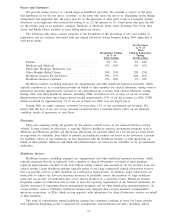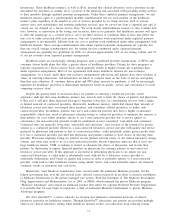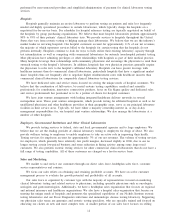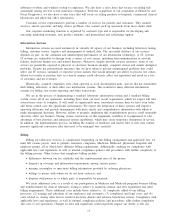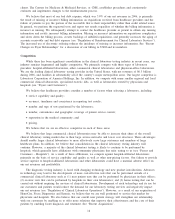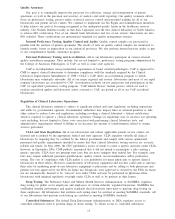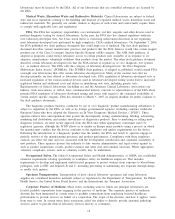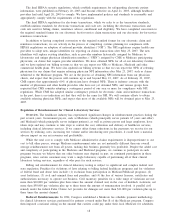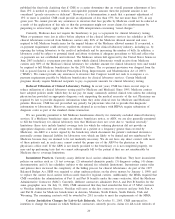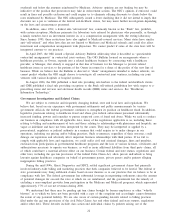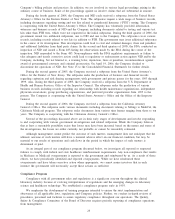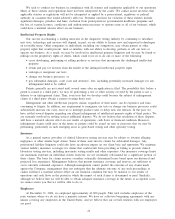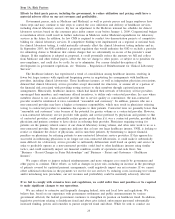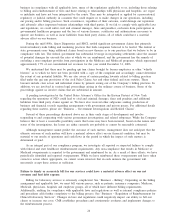Quest Diagnostics 2006 Annual Report Download - page 41
Download and view the complete annual report
Please find page 41 of the 2006 Quest Diagnostics annual report below. You can navigate through the pages in the report by either clicking on the pages listed below, or by using the keyword search tool below to find specific information within the annual report.published the final rule clarifying that if CMS or a carrier determines that an overall payment adjustment of less
than 15% is needed to produce a realistic and equitable payment amount, then the payment amount is not
considered “grossly excessive or deficient”. However, if a determination is made that a payment adjustment of
15% or more is justified, CMS could provide an adjustment of less than 15%, but not more than 15%, in any
given year. We cannot provide any assurances to investors that fees payable by Medicare could not be reduced as
a result of the application of this rule or that the government might not assert claims for reimbursement by
purporting to retroactively apply this rule or the OIG interpretation concerning “usual charges.”
Currently, Medicare does not require the beneficiary to pay a co-payment for clinical laboratory testing.
When co-payments were last in effect before adoption of the clinical laboratory services fee schedules in 1984,
clinical laboratories received from Medicare carriers only 80% of the Medicare allowed amount and were
required to bill Medicare beneficiaries for the unpaid balance of the Medicare allowed amount. If re-enacted, a
co-payment requirement could adversely affect the revenues of the clinical laboratory industry, including us, by
exposing the testing laboratory to the credit of individuals and by increasing the number of bills. In addition, a
laboratory could be subject to potential fraud and abuse violations if adequate procedures to bill and collect the
co-payments are not established and followed. The Medicare reform bill approved by the United States Senate in
June 2003 included a co-payment provision, under which clinical laboratories would receive from Medicare
carriers only 80% of the Medicare clinical laboratory fee schedule amount for clinical laboratory tests and would
be required to bill Medicare beneficiaries for the 20% balance. The co-payment provision was dropped from the
bill as passed (known as the Medicare Prescription Drug, Improvement, and Modernization Act of 2003)
(“MMA”). We cannot provide any assurances to investors that Congress would not seek to re-impose a co-
payment requirement payable by Medicare beneficiaries for clinical laboratory services. Certain Medicaid
programs already require Medicaid recipients to pay co-payment amounts for clinical laboratory testing.
Reduced Utilization of Clinical Laboratory Testing. In recent years, CMS has taken several steps to
reduce utilization of clinical laboratory testing paid by Medicare and Medicaid. Since 1995, Medicare carriers
have adopted policies under which they do not pay for many commonly ordered clinical tests unless the ordering
physician has provided an appropriate diagnosis code supporting the medical necessity of the test. Physicians are
required by law to provide diagnostic information when they order clinical tests for Medicare and Medicaid
patients. However, CMS has not prescribed any penalty for physicians who fail to provide this diagnostic
information to laboratories. Moreover, regulations adopted in accordance with HIPAA require submission of
diagnosis codes as part of the standard claims transaction.
We are generally permitted to bill Medicare beneficiaries directly for statutorily excluded clinical laboratory
services. If a Medicare beneficiary signs an advance beneficiary notice, or ABN, we are also generally permitted
to bill the beneficiary for clinical laboratory tests that Medicare does not cover due to “medical necessity”
limitations (these tests include limited coverage tests for which the ordering physician did not provide an
appropriate diagnosis code and certain tests ordered on a patient at a frequency greater than covered by
Medicare). An ABN is a notice signed by the beneficiary which documents the patient’s informed decision to
personally assume financial liability for laboratory tests which are likely to be denied and not reimbursed by
Medicare because they are deemed to be not medically necessary. We do not have any direct contact with most
of these patients and, in such cases, cannot control the proper use of the ABN by the physician or the
physician’s office staff. If the ABN is not timely provided to the beneficiary or is not completed properly, we
may end up performing tests that we cannot subsequently bill to the patient if they are not reimbursable by
Medicare due to coverage limitations.
Inconsistent Practices. Currently, many different local carriers administer Medicare. They have inconsistent
policies on matters such as: (1) test coverage; (2) automated chemistry panels; (3) diagnosis coding; (4) claims
documentation; and (5) fee schedules (subject to the national fee schedule limitations). Inconsistent carrier rules
and policies have increased the complexity of the billing process for clinical laboratories. As part of the 1997
Balanced Budget Act, HHS was required to adopt uniform policies on the above matters by January 1, 1999, and
to replace the current local carriers with no more than five regional carriers. Additionally, the MMA required that
CMS consolidate the administration of Part A and Part B benefits under the same contractor, titled the Medicare
Administrative Contractor (MAC). Currently, different contractors administer Part A and Part B benefits for the
same geographic area. On July 31, 2006, CMS announced that they had awarded the first of 15 MAC contracts
to Noridian Administrative Services. Noridian will serve as the first contractor to process and pay both Part A
and Part B claims for Medicare beneficiaries in Arizona, Montana, North Dakota, South Dakota, Utah and
Wyoming. The remaining contracts will be awarded by 2011 in order to meet the requirements of the MMA.
Carrier Jurisdiction Changes for Lab-to-Lab Referrals. On October 31, 2003, CMS announced its
intention to change the manner in which Medicare contractors currently process claims for lab-to-lab referrals of
20


